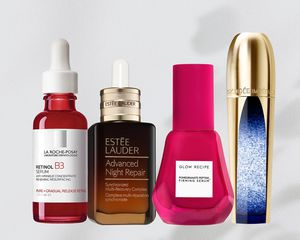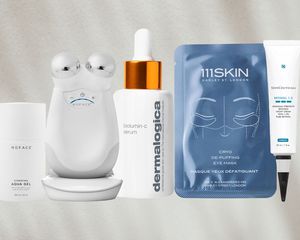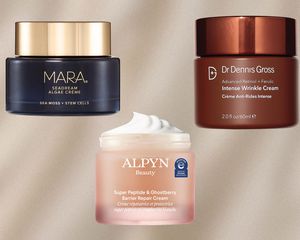:max_bytes(150000):strip_icc()/polypeptide-skincare-401417da668a4fd3b9b92f2e669fe59b.png)
Tawni Bannister for Byrdie
It's easy to become a skincare cynic when every other day you read about a new ingredient that promises to be an "overnight miracle" or "Botox in a jar." We get it, there's a constant influx of information and innovation in the skincare industry, but that doesn't mean there's not something to it. In fact, many of them have major benefits for skin. Take polypeptides, for example.
These tiny molecules may not be as popular as other ingredients, such as salicylic acid or retinol, but they're just as mighty. Composed of amino acids, polypeptides work diligently to create proteins which in turn boost collagen production, repair damage, improve skin elasticity, and enhance your overall appearance. These benefits are partly what make it such a popular anti-aging skincare ingredient.
We understand there's a lot of hype in the skincare world and that not everything buzzy lives up to its promises, so we tapped three board-certified dermatologists to ask them everything there is to know about polypeptides and get the answers. From what it is exactly and it's actual benefits to the potential downsides and how to use polypeptides to get the most results, keep reading for their insights.
Meet the Expert
- Jennifer Herrmann, MD, FAAD, is a board-certified dermatologist at Moy Fincher Chips Facial Plastic Surgery and Dermatology in Beverly Hills.
- Erin Gilbert, MD, FAAD, PhD, is a board-certified dermatologist and neuroscientist.
- Nancy Samolitis, MD, FAAD, is a board-certified dermatologist and the cofounder of Facile Dermatology + Boutique.
What Are Polypeptides?
According to Herrmann, polypeptides can best be understood as "small chemical compounds composed of short-chain amino acids, which are the building blocks of protein." Gilbert continues: "Peptides tell your cells to produce more collagen: one of the major building blocks of the skin. So by applying them directly to your skin, you're telling your body it needs to make more collagen," she says.
Having sudden flashbacks of junior high science class? We are, too, which brings us to our next burning question: Why have they been having such a buzz-worthy moment in the skincare spotlight, and why exactly are polypeptides so frequently found in our favorite serums and creams?
Polypeptides
Type of Ingredient: Protein
Main benefits: Smoothes fine lines, increases collagen production, decreases the appearance of pores.
Who should use it: Generally, polypeptides are safe for all skin types.
How often you can use it: For maximum effectiveness, polypeptides should be applied during both morning and nighttime skincare routines.
Works well with: Getting a facial peel before applying peptide products may help peptides penetrate the skin more deeply.
Don't use with: AHAs may reduce the efficiency of peptides.
"Peptides are essentially fragmented portions of proteins. So when they're used in skincare, the objective is for those fragments of collagen to stimulate collagen growth," explains Samolitis. "Complete, non-fragmented proteins (like collagen) are not able to be directly absorbed through the top layer of skin, so these smaller pieces are able to get deep into the cellular level."
"Peptides can be included in serums, moisturizers, and masks," Gilbert explains. "They are also included in some topical serums used after microneedling or superficial laser procedures to increase the penetration of the peptide and help the skin recover from the procedure."
Benefits of Polypeptides for Skin
"When used in cosmetic skin products, peptides fall into three main categories: signal peptides, carrier peptides, and those that inhibit nerve signals," Herrmann elaborates. "By acting as messengers, signal peptides can trigger collagen synthesis, which then increases skin firmness."
- Reduces the appearance of fine lines: By stimulating collagen production, peptides can give your skin the impression of being plumper: "Peptides help to rebuild collagen and preserve skin's youthful appearance," Gilbert says.
- Strengthens skin barrier: When peptides help amp up your skin cells, they may also help improve your skin barrier.
- Locks in hydration: As you age, collagen production decreases, which also causes dehydration. When peptides help boost collagen production, it also boosts hydration.
- May aid in collagen production: When collagen breaks down, the peptides send a signal to our skin's cells, informing them to make more collagen to replace what we lose naturally as we get older. "Every year, collagen production decreases, which causes wrinkles, dehydration, discoloration, loss of firmness, and a dull complexion," Gilbert says.
- Has anti-inflammatory properties: Antioxidants found in peptides help calm and soothe your skin, leading to less inflammation.
- Helps make skin more firm: By signaling your cells to produce collagen, peptides help your skin become more firm: "[Peptides] that inhibit nerve signals have the potential to soften fine lines caused by muscle movement—in theory, it's like topical Botox," Herrmann concludes.
- Smoothes out complexion: With upped collagen production likely comes clearer, more even skin, too.
- Repairs damaged skin: Carrier peptides work to heal your skin from the inside out.
Do Peptides Really Work?
Unfortunately, there's much more research needed to confirm if peptides truly hold anti-aging powers. "I personally haven't been convinced that peptides marketed to inhibit nerve signals effectively reach nerve targets (these are deep in muscles!) in large enough numbers to smooth lines as Botox can, but this may change in the future," says Herrmann. (For some context, many polypeptide-infused skincare products claim results as good—or better—than the treatment.)
Samolitis, too, has some disheartening news: "There just has not been significant scientific data on peptides for anti-aging, and they may not be as effective as the tried-and-true anti-aging ingredients like retinoids, AHAs, and antioxidants. Plus, the word 'peptide' can be used generically to describe any short chain of amino acids, so that term can easily be used for marketing even if the product does not contain a known active ingredient."
After zeroing in on your regimen, Herrmann says you can take it a step further with things like lasers or other skin-tightening treatments to maximize restoration and skin health. In other words, things like this (versus peptides alone) will act as a cherry on top.
How To Use Polypeptides
As you can probably guess, this trending ingredient has found its way onto store shelves in the forms of face washes, serums, creams, masks, and more. The frequency of usage will depend on the product or treatment that best suits you and your skin type. Generally, however, polypeptides are safe to use twice daily. It's also recommended that you opt for a peptide product that can be left on the skin, such as a cream or serum. We recommend Drunk Elephant's Protini Polypeptide Cream and Cocokind's Resurection Polypeptide Cream.
Byrdie Tip
If you're determined to try peptides in your skincare, don't waste your money on a peptide-filled product like face wash, which you'll rinse off almost instantaneously. Opt for a serum or moisturizer, which tends to have smaller molecule sizes and may penetrate the skin more deeply.


